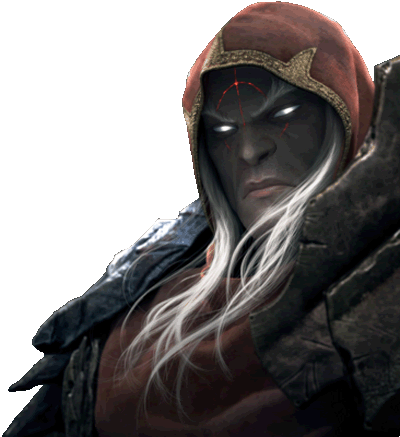This post has not been edited by the GamesBeat staff. Opinions by GamesBeat community writers do not necessarily reflect those of the staff.
There has been a disquieting niggling at the back of my mind when I've played certain video games of late. It's a sensation of de ja vu, of having played it all before. There are aspects of a game that resonate strongly with an experience I've had in the past, and it's not in the good way. It's like a recycling, a constant dredging up of old, successful video game cliches and affixing new packaging and graphics to it in order to make another quick buck.
Now there's nothing wrong with borrowing flavours of gameplay from other outstanding games and mixing it up in a new and different way. Experimenting, while not always a runaway smash hit (see Mirror's Edge) at least shows that developers are interested in pushing the medium forward and are not lazily resting on its laurels. This experimentation is what keeps gaming fresh and innovative. If this creative process is allowed to stagnate, then gaming as a whole will suffer greatly. Just imagine if every lucrative title spawned a yearly iteration of the same basic game in a new skin (see Call of Duty.) I'm not intrigued by the idea of playing a "new" game I finished last year and suddenly realising that that, while it's the latest installment, I'm just funding lethargic game developers who can't be arsed to utilise their imaginations.

Nothing spells out this conundrum better to me than Darksiders. I know this game's been out for quite some time but I've only just got around to playing it and that disquieting niggling that always prodded my cerebellum seems to have given up on gentle poking and decided to wail on me with a tyre iron. Darksiders is ashamedly the perfect example of why gaming's "triple A" titles are often disappointing and unfulfilling, especially for the outrageous cost of a new game in Australia (most will set you back $100AUD or more.)
Thus I will outline the abhorrent trends (read: absence of innovation) that pervade in the latest games and use Darksiders as the posterboy for what to avoid, so listen up game developers.
1. Themes > Character/Story Design – This is one of my biggest bugbears. Games spend exorbitant amounts of time and energy setting out the theme of the story you're in, going into rather impressive aesthetic detail, but completely ignoring character and story design. You're dropped into a world rich in scenery and lore, but it doesn't bloody go anywhere. It's like rocking up to the best restaurant in town where the atmosphere and decor are outstanding, and all of the menu items sound delectable, but all you get is a shriveled husk of meat and vegetables that better resemble dehydrated orange and green mush.
For example, Darksiders features a thick, velvety back story of how Earth could possibly eventuate if Heaven and Hell decided to have a free-for-all on our planet. Buildings are consumed with veiny, vine-like flesh, huge horned spires protrude from skyscrapers and fires smoulder relentlessly. The atmosphere is done exceedingly well, and even the physical design of the characters is rather novel (Samael's inverted wings actually look pretty cool). Humanity is wiped out, so for once you aren't wedged into the handsome, muscular man who is his species' last hope.
Unfortunately, everything else suffers. The storyline is as trite as trite can be. Find X demon, trudge through their lair, kill them. Rinse and repeat. The character design is where the largest disappointment occurs, however. Weak or done-before storylines can be pulled off exceptionally well if the characters themselves are novel, but Darksiders cares not for girly things like love or honour or an interesting conversation. I guess, being a Horseman of the Apocalypse, War is a one dimensional character, but I have no attachment to him. I'm just slinging a massive, overcompensatory sword through demon flesh just because I'm angry. That's it. Surely, with a bit of groupthink, the story writers could have given War a personality? No one else is fleshed out either; everyone is just a representation of authority, or power, or evil. Yawn. With all of this rich context, they just slap in flat, stereotypical characters? It's such a waste of material and goes a long way to deciding if I'll bother to endure the game to see a most likely lackluster ending.

2. Old game, new packaging – Usually common in franchises. A sequel to a wildly popular game emerges, sells thousands (or millions), but is really a rehash. The same game engine, gameplay, weapons, locations and characters are regurgitated into a commercial but risk free product. This is somewhat acceptable when a story is continued on from the last game, since there shouldn't be a huge degree of variation in an honest-to-goodness required sequel (Halo 3 shouldn't have me raising an adorable squadron of UNSC murder-hounds in the gameplay style of Nintendogs) but even then there should be evidence of a commitment to keep the gaming experience fresh. More weapons and more chances to pilot vehicles is not a sign of innovation. If new weapons or vehicles create new opportunities for excelled and interesting game play (Halo: Reach's space ship dog fights were a breath of fresh air) then that's great. That's what should be happening.
Otherwise, if it's just the same game with a few extra additions flung in there to appease the guilt of the developers, then it shouldn't be created at all. If it's not advancing a story, it doesn't need to exist. Apart from some minor party-friendly tweaks to the product, what real need was there for Activision to create Guitar Hero 5? Guitar Hero World Tour was the first step in innovating the series by adding extra instruments to create the band illusion, but can't extra songs and UI modifications be handled through DLC? Why should I fork out another $80 to $100 for the latest iteration if it, essentially, does nothing new?
Darksiders carries this stink all too well. Many liken it to the God of War franchise, which in itself has had a few copycats in its day (Dante's Inferno, Bayonetta, Ninja Gaiden) and you can't help but feel like you've played it before. The combos are pedestrian, the demons always die in the same way and you have to repeat these all the time.

3. Complete copy and paste – This is when a game will dig out almost precisely a mechanic or item from a game that it may not be related to at all and absorb it into itself. Some weapons and items are the bread and butter of an adventurer and can't really be considered as stolen from another game. Swords, bows and arrows, staves, daggers, crossbows, gauntlets … there's nothing new under the sun when it comes to arming one's self. However, blatantly ripping off an item and dropping it into a game with a new name is just pathetic and not resourceful.
Darksiders is guilty of this sin multiple times. The Crossblade is a redesigned version of The Legend of Zelda's boomerang, even capable of collecting energy and locking onto multiple targets to transfer it (Twilight Princess uses the same mechanic with wind). The Chronomancer allows War to slow time to reach objectives he is otherwise incapable of reaching; he only uses it a handful of times, but how is he doing it without The Prince of Persia's help? By far the worst rip off is the Void Walker, a relic that is Portal's portal gun in everything but name. It even creates blue and orange rimmed portals and uses the concept of momentum to fling War higher.

There's nothing here I haven't seen before. Darksiders is a decent action/puzzle hybrid, but it lacks something, and its absence is palpable. It lacks creativity and innovation, and an identity of its own. If these brand new games are just copies or hobbled patchworks of past games, then why should I play them?
Originally posted on 8bitopinion.wordpress.com
